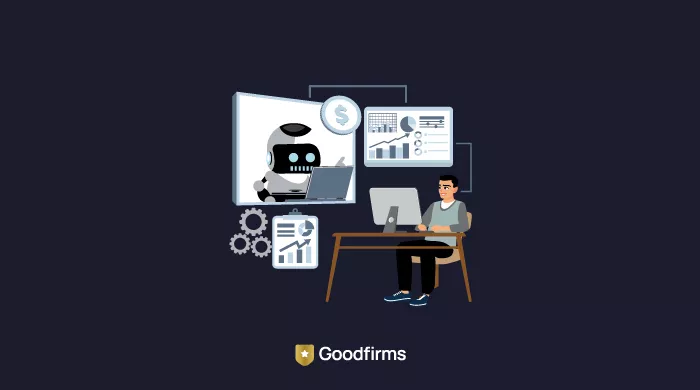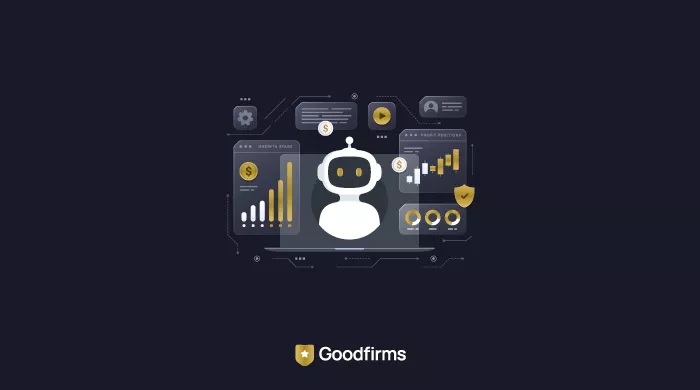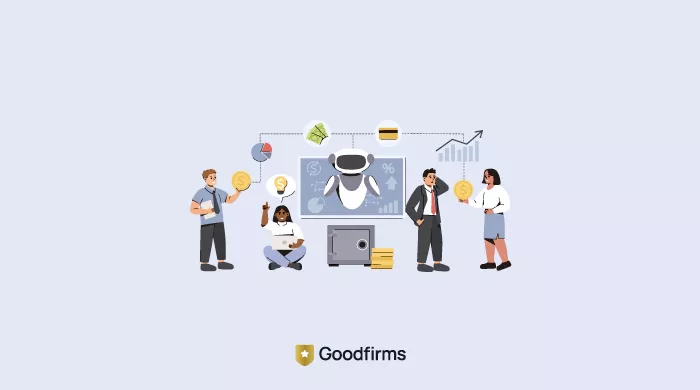Artificial intelligence (AI) is creating wonders in every industry, and finance and insurance are no exceptions. AI is transforming finance and insurance sectors by automating workflows, enhancing decision-making, and improving customer experiences. In finance, AI-powered tools help analyze vast datasets to enhance fraud detection, risk assessment, and investment optimization. Moreover, insurance companies leverage generative AI to streamline claims processing, personalize policies, and predict customer needs. AI-driven chatbots and virtual assistants improve customer interactions for businesses, while predictive analytics helps refine underwriting and risk management. However, while AI-powered automation increases efficiency, maintaining a human touch remains crucial in AI use for building trust and handling complex cases. As AI continues to evolve, one must thus focus on balancing automation with human expertise and regulatory norms, to drive innovation across financial services and insurance sectors without compromising on security. Businesses are thus looking for Artificial Intelligence (AI) development Companies to leverage the maximum potential of AI and achieve enhanced business outcomes.
Goodfirms Roundtable is a series of podcast interview discussions where leading industry experts, CEOs, and people holding prominent positions in IT services and software companies share their valuable experiences and opinions on various topics. The podcast discussion becomes a rich source of information for budding entrepreneurs willing to start their businesses.
Goodfirms recently had a chance to interview Ankur Patel, CEO, Multimodal. In the following podcast discussion, Ankur shares his knowledge and views about how AI is revolutionizing the financial services and insurance sectors, and how multimodal is leveraging AI agents to drive efficiency and compliance in these highly regulated industries.
Multimodal is a US based Generative AI company that specializes in broad-spectrum AI-powered automation and other IT services. The company facilitates automation of end-to-end workflows for finance and insurance, including retail banking automation, commercial banking automation, financial services automation, credit union automation, payments automation, credit rating agency automation, life & disability insurance automation, P&C insurance automation, accident & health insurance automation, brokerage & reinsurance automation, commercial insurance automation, travel insurance automation, and more. Multimodal is the perfect services partner for businesses looking to embrace innovation through AI-enabled automation. The company has been offering top-quality services to its clients, enabling them to enhance their business opportunities and turn their imagination into a feasible and profitable business model.
The Podcast Discussion Highlights the Following:
- About Multimodal, and the company’s CEO.
- How to stay motivated to continually learn and share knowledge, and some advice for companies looking to make an impact in AI.
- How to balance the demands of leading a tech company with personal as well as professional growth, and how challenging can it be? How Ankur approaches this balance.
- Some unique aspects of generative AI that can be specially promising for automating workflows in the financial services and insurance sector.
- How to balance personalization with privacy while using AI, especially when working with client specific tasks and sensitive data in banking and insurance.
- How do Multimodal’s AI agents retain institutional knowledge as well as human employees? Some challenges that the company faced in achieving this.
- Whether the AI agents developed by Multimodal are fully autonomous or they require human workflows.
- Some successful applications of Multimodal’s AI agents and client workflows, with a specific example of application that stands out.
- Regulatory challenges that Multimodal had to overcome in regulated sectors like finances and loan approvals, and how the company ensures ongoing compliance.
- How to ensure establishing and maintaining client trust, which is critical while leveraging AI agents in the finance sector.
- Examples of some unexpected outcomes from AI implementation that changed operations in unforeseen ways.
The Podcast Also Covers These Crucial Points:
- How the workforce has responded to working alongside AI agents, and their feedback on the same.
- How and why AI should be embraced and viewed as a partner and not as a replacement to humans.
- Some innovations in generative AI that can shape the financial and insurance sectors in the next 5 to 10 years.
- Some major goals or milestones that Multimodal is aiming for in the near future.
Ankur, You Have Had a Fascinating Journey Moving From Traditional Finance at J. P. Morgan to the Tech Driven World of AI and Machine Learning. What Inspired This Shift and How Has Your Experience in Finance Influenced Your Work in AI Today?
Ankur believes that having experience in these regulated spaces like finance helps a lot as it helps one understand things like how it works behind the scenes, how decisions are made, what is regulatory scrutiny, and more. This provides Ankur customer empathy, and allows him, as a software vendor selling automation platform, to build the platform and more quickly design solutions that align well with targeted verticals.
Moving On, You’ve Authored Two Books and How Do You Stay Motivated to Continually Learn and Share Knowledge, and What Advice Would You Give to Others Looking To Make an Impact in AI?
Ankur suggests that one must have a passion for learning and developing new skills as the world of AI machine learning has been constantly changing over the last decade. Ankur believes that curiosity laid the foundation for learning about generative AI. However, as it is a new technology, it is essential to operate with a beginners’ mindset and figure out new ways of getting it to the market. Further, Ankur believes that it is important to continue the journey of learning to stay on top of all the new items and then ultimately deliver that as part of their platform to the customers.
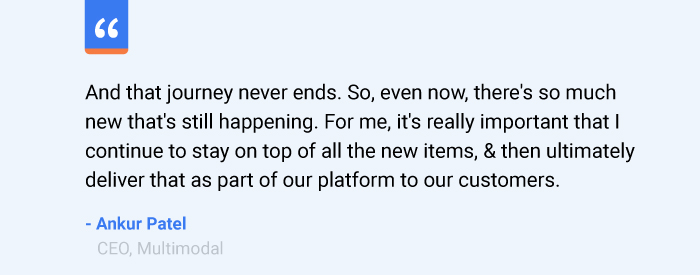
You Know, You Approach Tech in the Community Aspect, Wherein Sharing Insights Lifts the Whole Field Forward. Now Let’s Discuss About Balancing the Demands of Leading a Tech Company With Personal as Well as Professional Growth, and How Challenging Can It Be? How Do You Approach This Balance?
Ankur specifies that while building a company, at the early stage one needs to be completely involved, and this does not leave much scope for balance. It is also because generative AI is trending and there is a gold rush where everybody is racing to take the maximum advantage of this quickly. According to Ankur, with so many players, new and incumbents competing with each other, it is essential to accept and embrace the imbalance. However, to prevent a burnout, one must build a team with the right set of self-motivated people who are willing to share the load and effort.
Ankur informs that eventually as the firm gets larger and more ambitious, one can then manage to take a step back and relax with family and friends. This is equally important, including managing sleep, managing stress, working out, eating well, and focusing on other general pivotal things to make life more manageable. In summary, it is important to accept that it will not be feasible to expect balance at an early stage as a startup.

What Unique Aspects of Generative AI Do You See as Specially Promising for Automating Workflows in the Financial Services and Insurance Sector?
Ankur explains that the goals in the finance and insurance sectors are similar, like improving their employee experiences and customer experiences and capturing new revenue. However, the tools available to them now are much different compared to the tools being used 5 to 10 years ago. Ankur highlights that RPA, predictive analytics, and big data are past trends. Businesses now need AI agents and agentic AI, as the ultimate goal is to improve employee productivity, deliver better customer experiences, and find new ways to grow.
According to Ankur, while the ultimate goal is creating paths for revenue growth, the way to achieve it has now changed. Agentic AI, unlike traditional software, does not just help improve human work, but is actually designing AI labor; for example, an AI agent can do the work of a claims adjuster or a loan officer. In summary, agentic AI works like junior employees, enabling companies to make their teams 300 percent to 400 percent better off and more productive and operating 24*7.
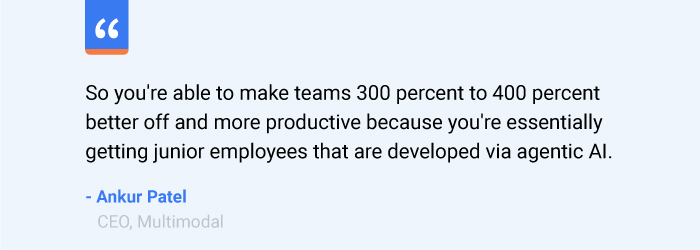
Now Let’s Talk About Data Privacy, Especially When Working With Client Specific Tasks and Sensitive Data in Banking and Insurance. How Do You Balance Personalization With Privacy?
Talking about privacy, Ankur clarifies that in banking and insurance, the software needs to be deployed on the clients’ infrastructure, i.e. on their virtual private cloud or on premise. Thus, data is within their gated environment and not leaving their walls. However, within their organization, it is essential to create robust permissioning and roles-based access so that unauthorized people cannot gain access to sensitive information. Ankur adds that creating fine-grained permissions and roles within the organization helps keep the data within the clients’ wall, while ensuring that their employees have access to information that they absolutely need, but not anything more that they should ideally not be accessing.

How Do Multimodal’s AI Agents Retain Institutional Knowledge as Well as Human Employees? Any Challenges You Have Faced in Achieving This?
Ankur reveals that while people believe that prompting large language models is sufficient in building AI agents for very complex workflows, the processes in finance and insurance are actually much more complex and cannot be handled with just simple prompts. Thus, one needs to break down the workflows into smaller tasks and then start training task specific LLMs. Ankur details that it is crucial to fine-tune LLMs and adjust model weights, while incorporating domain knowledge and company specific knowledge in the form of embeddings.
In short, the models can access and leverage the core data and knowledge within the company and adjust weights to achieve a much higher level of precision, like junior employees who learn from the work that prior veterans have done, incorporate that knowledge into their brain, and adjust the brain in order to incorporate new knowledge to enhance the work performance. This is the way to make AI agents work; you need to have the LLMs fine tuned on company specific data, workflow specific data, and then they will get better over time through this feedback mechanism and fine tuning that happens.
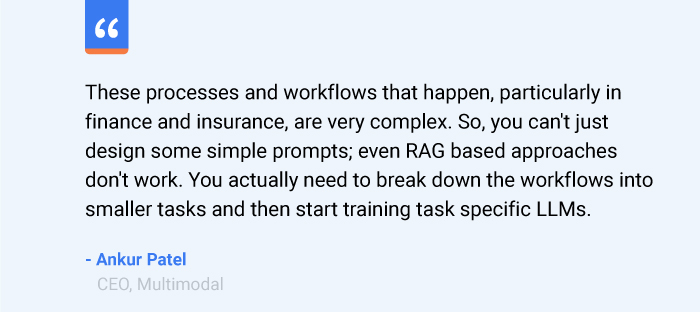
You Have Essentially Built a System Wherein AI Grows With the Company, Making It a Seamless Part of the Team. You Know That Is Really Interesting to Learn or Understand Here. Are Your AI Agents Fully Autonomous or Do They Require Human Workflows?
Ankur highlights that the customers do expect human supervision as they get started. So, the company leverages AI agents to manage much of the high volume, repetitive work like income and identity verification or claims processing and insurance, but there are human supervisors on the company side to review the outputs and provide a level of comfort to the clients. These human agents further provide feedback that enables the AI agents to improve model performance and make changes accordingly.
Further, Ankur mentions that they also leverage third-party software APIs as needed for best outcomes; for example, in a compliance workflow, third-party APIs can help do adverse monitoring or identify politically exposed people. In summary, Ankur specifies that their job is to create a perfect orchestration of work between AI agents, the human supervisors, and third party APIs. However, doing end-to-end autonomous operations from day one is typically not possible in certain areas, and there, human supervision definitely dominates over AI agents.

Moving on to Our Next Segment Regarding Applications and Impacts, What Are Some Successful Applications of Your AI Agents and Client Workflows? Any Example That Stands Out?
Ankur reveals that their successful applications with AI agents include loan origination, particularly in mortgages. Ankur explains that it is similar to the way loan officers in mortgages take a packet of income and identity documents from the borrower like pay stubs, bank statements, verification of employment, W2, driver's license, passports, and more. These documents are then reviewed and analyzed to figure out whether the borrower meets their minimum requirements.
Besides, Ankur adds that here the AI agents leveraging generative AI do wonders in document understanding, document reasoning, and pulling information into a loan origination system, enabling companies to process a large volume of applications very quickly and providing the borrower a quote within just a couple of hours. Moreover, this helps the loan officer to explore the best opportunities with the underwriters and then get the quote to the borrower and proceed with that faster.
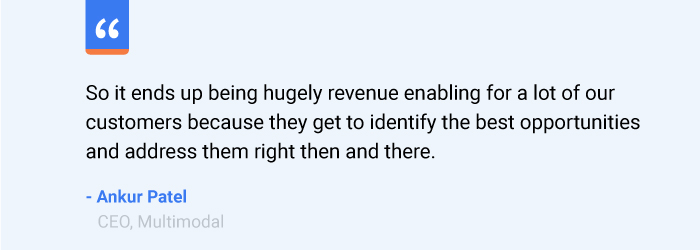
That’s an Impressive Impact, Especially Like in Process Related to Finances and Loan Approvals, Where Speed Is So Crucial to Customer Experiences. Right on a Similar Note, in Such Regulated Sectors, What Were Some Regulatory Challenges You Had to Overcome and How Do You Ensure Ongoing Compliance?
Ankur highlights that while most of the responsibility for regulatory scrutiny lies on their customers, Multimodal’s role is to make sure that their application adheres to regulatory scrutiny.
Ankur further elaborates that having full audit trails is really important for compliance and for external regulation, as the audit trail must capture every single action that the AI agent took, changes that the human supervisor made, and point out all actions taken. In summary, it is critical to ensure having that full lineage of activity, to be able to backtrack and trace what happened that led to a particular outcome. Ankur summarizes that this is what their customers need to meet compliance and regulatory requirements.
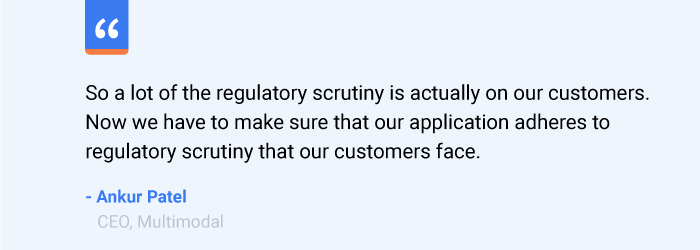
You Have a Proactive Approach, Which Is Very Essential Here, Keeping Systems Adaptable to Regulatory Changes, and It Also Helps Clients Avoid Disruptions and Maintain Something That’s So Important for Finance, Which Is Called Trust.
Ankur endorses that trust is critical, however, adds that it develops slowly with time. Ankur further highlights that change management has an important role here. For this, while introducing AI agents, they also need to ensure that they earn the trust of the buyer and the actual users who are using the agents and working alongside them. One needs to work on how the technology gets adopted by the business users, are they getting the full value, are they skeptical of it, or are they fearful of it?
Furthermore, Ankur adds that their company understands the clients’ blockers and implements a change management approach to ensure that the clients get maximum value from technology.
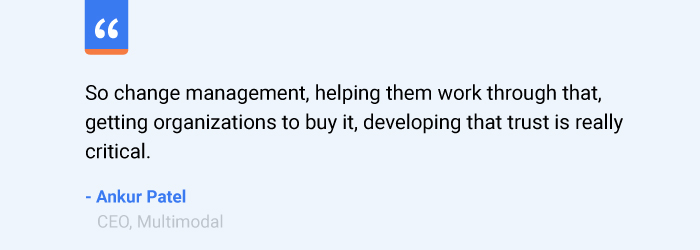
Have You Noticed Any Unexpected Outcomes From AI Implementation That Changed Operations in Unforeseen Ways?
Talking about unexpected outcomes from AI implementation, Ankur agrees that sometimes they realize that the AI agent does not come out as expected, maybe due to insufficient or messy data available, providing no value to the customer. Ankur adds that in such circumstances, one must take a step back and brainstorm on questions like, “what data did we have access to? Was the data problematic? Did we not have enough data?”. Further, one needs to identify what is working and what is not, and figure out what exactly is the limiting factor. This enables one to identify and address the issue correctly through iterative experiments.
Ankur specifies that their platform allows having very quick iterative experiments to identify whether the AI agents are working well and then deploy those into production. Besides, this allows them to spend more time on addressing additional shortcomings like other complex issues, unforeseen outcomes, and deficiency in achieving the required results.
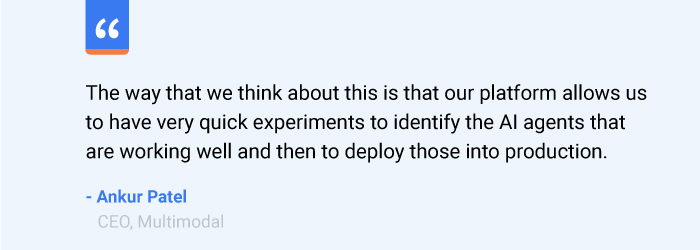
How Has the Workforce Responded to Working Alongside AI Agents? And What’s Their Response, Like the Feedback That You Have Received From Them?
Ankur reveals that in early stages they were apprehensive about how people will respond to and accept this new technology; however, gradually they found people to be highly receptive to AI agents, mainly because it helps employees do the tasks they do not want to do, including the most repetitive, boring, and administratively tasking work. Ankur adds that the future of work will be like AI will do the more repetitive and administrative work, and humans will be able to spend more time on edge cases requiring critical thinking and human intellect.
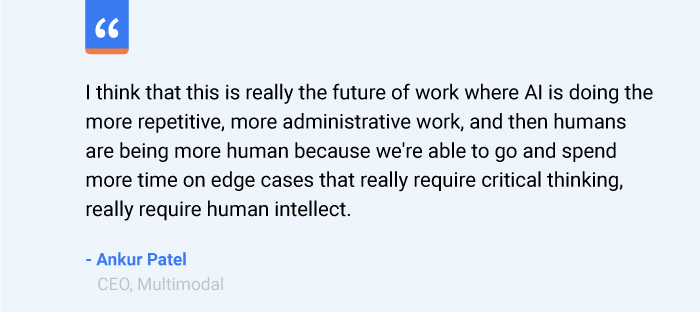
It’s Great to See AI Being Embraced as a Partner and Not as a Replacement, and as You Said, Helping People Focus More on Meaningful Work and AI Can Handle the Rest That’s Repetitive Tasks Related to a Job. Isn’t That Relieving to Hear So Many of Us Were Worried About It, Being Like Taking Our Spot in the Beginning, but Now It Seems Working Really Well Occasionally as Well With the Current Jobs That We Have.
Ankur admits here that leveraging AI will soon leave fewer roles and fewer openings in some of these roles for humans. Moreover, while it provides initial task replacement for now, eventually when we will have a lot of AI agents, it will also affect the number of people being hired; for example, companies might not need as many loan officers to handle the full queue. However, Ankur further believes that though it will have a labor market impact like any new technology, soon the people in these roles will adapt and switch to other tasks that were essential but they did not have time to work on, reaching the top level of human productivity.
Ankur also clarifies that while there is task replacement, it is not necessarily a bad thing altogether; for example, a large proportion of the population in Western nations is getting older and retiring. This is creating a critical situation in the insurance sector, where you have a lot of veterans that retire, but don't have enough young people to replace them and take up these roles. Ankur emphasizes that AI agents are thus the solution to the problem here, to handle the big demographic shift that's happening.
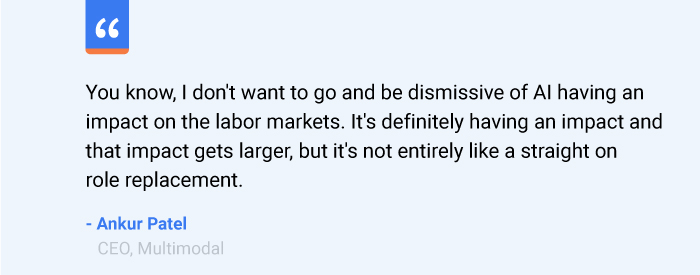
What Are Some Innovations in Generative AI That You Believe Will Shape the Financial and Insurance Sectors in Next 5 to 10 Years?
Ankur elaborates that there are a couple of innovations in generative AI that can shape the financial and insurance sectors in the next 5 to 10 years, a prominent one being multi-agent systems instead of standalone agents that work in just one area. Further, multi-agent systems will include agents that go and work collaboratively as a team, sharing information across the organization.
Besides, according to Ankur, AI agents will act like a form of labor, allowing people to choose between hiring a human or hiring an AI agent to go and do a particular role or task. Moreover, in white-collar office work requiring knowledge, AI will enable businesses to run a very lean, efficient operation with fewer people.
Ankur highlights that with AI taking up such roles, it will become crucial for us as a society to figure out the right roles and opportunities to fit humans. Ankur believes that there will still be ample opportunities available to humans, for example, in the finance industry where human agents are not readily available to deal with customer support tickets; here, with AI agents managing many other tasks, human agents will get more time to spend on the phone with customers. Ankur emphasizes that this will help resolve more customer queries with enhanced response and can be highly beneficial and valuable to customers.
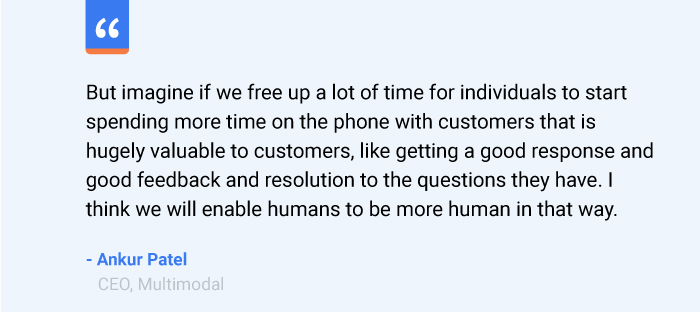
What’s Next for Multimodal? What Are Some Major Goals or Milestones You Are Aiming For?
Ankur elaborates that Multimodal’s major goal right now includes getting more customer traction in mid market and enterprise. For the customers in production, the company further aims at proving that having a platform-first approach allows you to get to a value more quickly across many different departments. According to Ankur, Multimodal is looking forward to a broader adoption of their platform across workflows, in a very large enterprise.
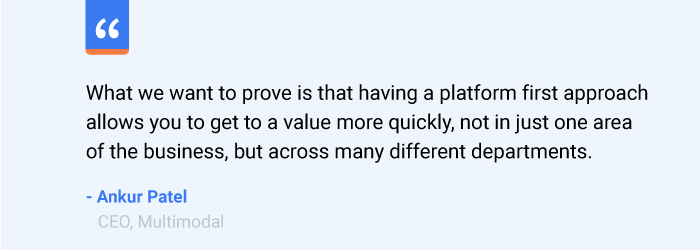
The podcast concludes with the rapid fire round where Ankur offers a valuable piece of advice for those considering a career in AI:
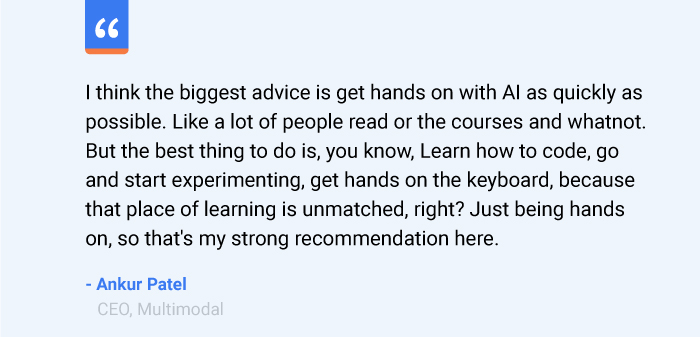
You can listen to this podcast here.
What’s Next
Artificial intelligence is transforming the finance and insurance sectors by helping enhance customer experience, improve compliance, and drive personalization. AI agents are capable of analyzing vast datasets to optimize decision-making, boost profits, and enhance productivity. In finance, AI enhances risk assessment and fraud detection; while in insurance, it streamlines claims processing and policy pricing. However, data privacy remains critical while leveraging AI for these sectors, and businesses must ensure that their AI partners take appropriate measures to secure their sensitive data. Businesses must hire the right AI consullting companies, experienced in balancing innovation with regulatory requirements, to build robust AI-powered applications that enable them to improve performance and make financial and insurance services more efficient, customer-centric, and competitive in the ever-evolving digital world.
You can share your knowledge or experience on our platform on any topic related to IT services. Just drop an email to [email protected].





